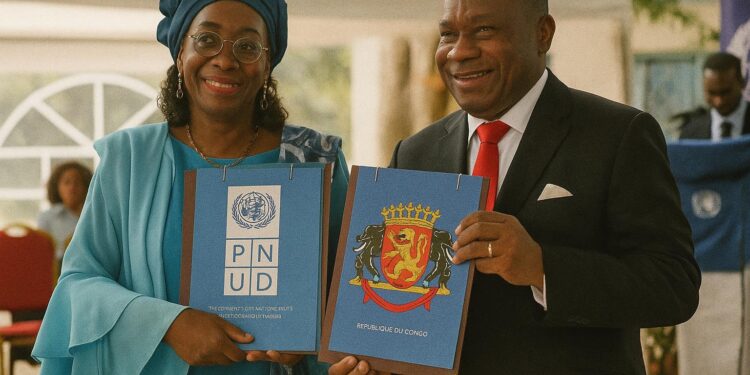Strategic Context for Innovation Policy
In the corridors of the Ministry of Scientific Research in Brazzaville, the phrase “innovation-led diversification” has become a mantra. Congo-Brazzaville, still deriving more than half of its export revenues from hydrocarbons, faces a dual imperative: cushion its economy against oil price volatility and align with Agenda 2063, the African Union’s continental blueprint. The newly articulated National Innovation Policy, validated late in 2022, attempts to weave those imperatives into a coherent roadmap, positioning science and technology as the hinge on which future resilience may turn (African Union, 2023).
The UNDP Partnership Footprint
Against this backdrop, the United Nations Development Programme has emerged as a pivotal technical ally. At the signing ceremony for “Congo Creative 2030”, Resident Representative Adama-Dian Barry recalled the agency’s global Accelerator Lab network, noting that the Brazzaville node has already catalogued more than two hundred and fifty community-sourced ideas ranging from inexpensive solar dryers to mobile fintech platforms (UNDP Congo, 2024). Her pledge that the UNDP will “accompany the Republic in operationalising its innovation agenda” signalled a calibrated confidence in Congo’s institutional capacity, while implicitly recognising the need for sustained external expertise.
Congo Creative 2030: Architecture and Ambition
At the heart of the accord lies the future National Centre for Innovation, christened UniPod. Conceived as a one-stop hub, UniPod will host prototyping facilities, seed-fund windows and data observatories designed to track the performance of funded projects. Minister Rigobert Maboundou framed the centre as “the concrete operationalisation of our Research and Innovation Policy” and insisted that innovation must switch from being an occasional experiment to “a central public policy”. The programme targets measurable outcomes by 2030, including an increase in the share of non-oil goods in export baskets and a rise in national R & D expenditure to one percent of GDP, a threshold recommended by UNESCO (UNESCO Science Report, 2021).
Youth Agency and Local Solutions
One of the most resonant aspects of the partnership is its deliberate courtship of young innovators. Demographic data place more than sixty per cent of Congolese citizens under the age of thirty-five. In marginalised urban districts such as Talangaï or Makélékélé, informal repair workshops have long served as improvised laboratories. By mapping those micro-ecosystems, the Accelerator Lab has unearthed solutions that are frugal yet highly adapted to local constraints, from recycled-plastic paving tiles to low-cost drip-irrigation kits. Integrating such grassroots ingenuity into formal value chains could, analysts argue, provide the social legitimacy often lacking in top-down industrial schemes.
Financing and Institutionalisation Challenges
While the political rhetoric is unequivocal, funding the vision remains complex. Public expenditure tightened after the 2020 commodity shock, and sovereign debt hovers around ninety per cent of GDP (World Bank, 2023). The government therefore seeks blended finance models that combine concessional resources with private venture capital. For investors, regulatory clarity will be decisive. The forthcoming technology transfer bill, presently before parliament, is expected to stipulate tax holidays for start-ups and intellectual-property provisions aligned with the African Regional Intellectual Property Organisation. Observers note that without swift enactment, the momentum generated by Congo Creative 2030 could dissipate.
Regional and Global Linkages
Brazzaville’s calculus extends beyond national borders. By intersecting with the African Continental Free Trade Area’s digital-services chapter, Congolese innovators could access a market of 1.3 billion consumers. Moreover, the Economic Community of Central African States intends to create a regional patent pool, a move expected to lower transaction costs for cross-border collaboration. Diplomatic interlocutors in the sub-region see UniPod as a potential anchor institution, capable of hosting joint programmes with Cameroon’s newly-launched Silicon Mountain cluster or Rwanda’s well-established Kigali Innovation City.
Evaluating Prospects for 2030
As the applause faded in the ministry’s auditorium, practitioners were left to reconcile aspiration with execution. Congo Creative 2030 undoubtedly embeds innovation at the core of national discourse and secures credible multilateral backing. Yet the pathway to scalable impact will hinge on inter-ministerial coordination, predictable funding streams and a regulatory environment that privileges experimentation over administrative inertia. International partners, for their part, have staked reputational capital on the venture’s success. Should the UniPod meet its milestones, Brazzaville could evolve into a sub-regional exemplar of inclusive innovation policy, affirming that strategic foresight, rather than oil alone, can chart the republic’s economic horizon.












































